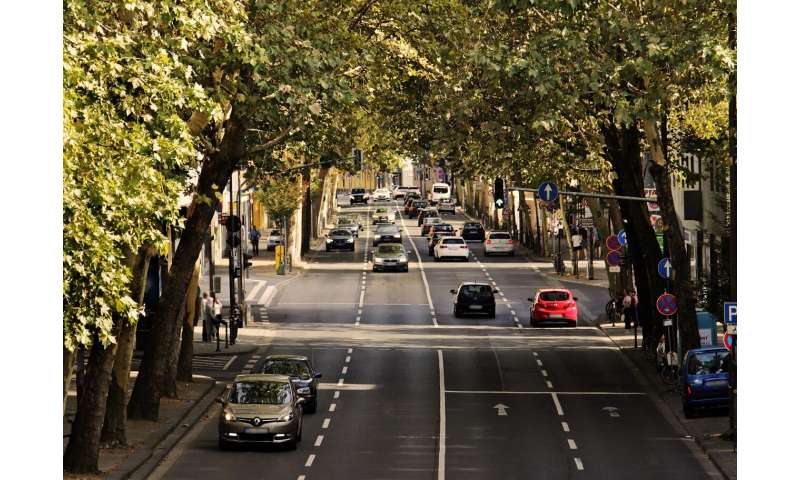Cutting road transport pollution could help plants grow

Cutting emissions of particular gases could improve conditions for plants, allowing them to grow faster and capture more carbon, new research suggests.
A cocktail of gases—including nitrogen oxides, carbon monoxide, volatile organic compounds and methane—combines in the atmosphere to form ozone.
Ozone at the Earth's surface limits photosynthesis, reducing plants' ability to grow.
University of Exeter researchers say cutting emissions of ozone-forming gases offers a "unique opportunity" to create a "natural climate solution".
A 50% cut in emissions of these gases from the seven largest human-made sources—including road transport (the largest emitter) and energy production—would help plants contribute to "negative carbon emissions", the study says.
"Ecosystems on land currently slow global warming by storing about 30% of our carbon dioxide emissions every year," said Professor Nadine Unger, of the University of Exeter.
"This carbon capture is being undermined by ozone pollution.
"Our findings suggest the largest losses of plant productivity are in the eastern United States, Europe and eastern China, which all have high levels of surface ozone pollution.
"The impact on plant growth in these areas is estimated to be 5-20% annually."
Ozone is not emitted directly but forms in the atmosphere during complex chemical reactions of carbon monoxide, methane, non-methane volatile organic compounds and nitrogen oxides.
The seven areas of human activity that emit the largest amounts of these gases are agriculture, residential, energy, industry, road transportation, waste/landfill and shipping.
The study says a target of cutting these specific emissions by 50% is "large but plausible", citing examples of cuts already made in some industries.
"Deep cuts in air pollutant emissions from road transportation and the energy sector are the most effective mitigation measures for ozone-induced loss of plant productivity in eastern China, the eastern United States, Europe and globally," said Professor Unger.
"Our results suggest mitigation of ozone vegetation damage is a unique opportunity to contribute to negative carbon emissions, offering a natural climate solution that links fossil fuel emission abatement, air quality and climate.
"However, achieving these benefits requires ambitious mitigation efforts in multiple sectors."
The paper, published in the journal Nature Climate Change, is entitled: "Mitigation of ozone damage to the world's land ecosystems by source sector."
More information: Mitigation of ozone damage to the world's land ecosystems by source sector, Nature Climate Change (2020). DOI: 10.1038/s41558-019-0678-3 , https://nature.com/articles/s41558-019-0678-3
1 comment:
I rarely share my story with people, not only because it put me at the lowest point ever but because it made me a person of ridicule among family and friends. I put all I had into Binary Options ($690,000) after hearing great testimonies about this new investment
strategy. I was made to believe my investment would triple, it started good and I got returns (not up to what I had invested). Gathered more and involved a couple family members, but I didn't know I was setting myself up for the kill, in less than no time all we had put ($820,000) was gone. It almost seem I had set them up, they came at me strong and hard. After searching and looking for how to make those scums pay back, I got introduced to maryshea03@gmail.com to WhatsApp her +15623847738.who helped recover about 80% of my lost funds within a month.
Post a Comment